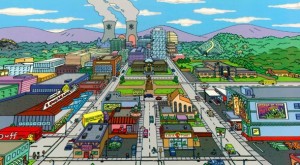
[Enjoy this D’OHverthinking It guest post from Chris Morgan!]
We all have a touchstone in our lives. The one thing we hold closest to our hearts. The one thing we can always rely on. For some it’s family or religion. For others it’s bees (apiarists mostly). For me, it’s The Simpsons. As far as I am concerned it is the most glorious thing mankind has ever accomplished, and you can take all your airplanes, polio vaccines, and wheels and jump in a lake if you disagree. On December 17th, the show celebrated its 20th anniversary. There have been 450 episodes, and I have seen every single one of them.
Of course, people have been complaining about the show for years. Cries of “Worst episode ever” have been heard for so long, they were able to deal with it in “The Itchy and Scratchy and Poochie” episode (my personal favorite) and that was all the way back in season eight when the show was still fantastic. I have never been one who likes to bemoan the show. If anything, I am a Simpsons apologist. Yet even I must admit the show is a mere shadow of what it used to be. In fact, I don’t even really look forward to new episodes anymore. I merely sit down in front of my TV (or my internets, more often) and hope for the best. I no longer love the show, but I cannot bring myself to leave them. You know, like most marriages.
In fact, and I it depresses me to even have to say this, but last season me and the show had our lowest moment; I couldn’t make it through the full episode. It was just too bad. It was the episode “Double, Double, Boy in Trouble” in which Bart meets his exact double who, get this, comes from a rich family! Hilarity didn’t ensue, soul crushing did. I made it through leprechaun jockeys. I made it through raccoon families that look like the Simpsons. I couldn’t make it through this.
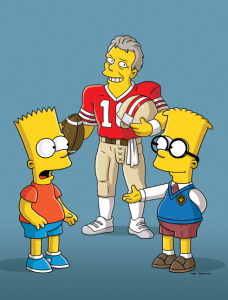
These days, I truly think the show is at its worst. Now, all Simpsons fans have their own theories and reasons why the show doesn’t have the same impact it used to. Many feel that the characters aren’t relatable anymore. Some blame this on former show runner Mike Scully, who was the executive producer from season nine until season 12. He allowed the show to devolve into silliness (he oversaw the aforementioned leprechaun jockey fiasco). Brilliant Simpsons writer John Swartzwelder has a penchant for allowing his writing to devolve into complete absurdity if it isn’t kept in check (as any of his novels can attest to) and under the watch of Mike Scully that didn’t happen. Scully also subjected us to the scourge of humanity that are show writers Tim Long and Carolyn Omine, whose names on the “Written By” credit always gives me the chills. Omine’s writing style would fit in better over at Family Guy, as she has an annoying habit of including off hand pop culture references in her work (look no further than the episode where Homer becomes an ice cream truck driver for reference). Long’s writing suffers from being too silly, too over the top, and usually lacking any heart. He’s the man behind the leprechaun jockey episode I keep referencing, as well as the episode where Bart becomes a member of a boy band whose music is used to subliminally recruit people into the army. Really.
However, since Al Jean (who co-show ran seasons three and four with Mike Reiss before creating The Critic) took over the show in season 13, things haven’t really gotten any better. Some other common complaints are that Homer has gotten too stupid and/or too mean. Over at the website “Bone The Fish” which is apparently the spiritual successor or Jump the Shark which was bought by TV Guide and turned into a gossip website, the number one moment listed is when the show killed off Maude Flanders. This, in a roundabout way, brings me to why I feel the show isn’t as good as it used to be. Here was a character people came to know and love who was suddenly and callously killed off. As the episode “The Principal and the Pauper” dealt with, viewers get really attached to the characters on a show. However, I feel that is no longer possible with The Simpsons and that is the main reason for both its sagging quality, and thus its sagging popularity.
Why are these characters we once knew and loved no long knowable and loveable? Well, because it’s nigh impossible to really have a feel for the characters anymore. The show has had six different show runner eras involving nine different people. They have had countless different writers. This, combined with the need to create new stories after so many years, has led to writers ascribing traits to characters they once didn’t have. Many times, these traits are contradictory to everything we knew about the character. Often, they are tossed aside and the character returns to the way they use to be, or develops entirely knew characteristics. I’m not merely talking about the various degrees of Homer’s stupidity. I am talking about the core, basic traits of these characters and their moral and ethical standing.
Take, for example, Bart Simpson. He’s never been my favorite character, but he has for the most part been alright with me and is, of course, a key member of the show. In the early years, when Bart became the breakout star, recording novelty records and shilling crumbly candy bars, he was the focal point of the show. It was a show about Bart the mischievous son rebelling against the harsh authority figure, Homer. The show started to focus more on Homer as it went on (and in later years focused more and more on secondary characters) but Bart’s character remained essentially unchanged. He was the prankster, the class clown, a modern day Dennis the Menace right down to the slingshot.
However, he was mostly harmless, and thus likeable. That was, until the episode “Please Homer, Don’t Hammer ‘Em” written by Matt Warburton (one of the more subversive writers the show has ever had). The A-story is all well and good; Marge finds a love for carpentry but needs Homer to be the face of the operation because nobody in town takes a female carpenter seriously. The episode gets into gender role stuff and Homer’s fear of being emasculated by Marge. It is all well and good. The B-Story is where I have an issue. It turns out Principal Skinner has a very serious peanut allergy. As in, even touching peanuts can bring him to the brink of death. Bart finds out about this, and decides to use it to his advantage. Instead of using this information to pull off harmless pranks or get some leniency in school, however, he instead forces Skinner to do some really creepy and weird things, one of which involves filling his pants with cats and dynamite. A ridiculous notion, perhaps, but a disturbing one nonetheless. So, to reiterate, Bart is forcing Skinner to do really unpleasant and messed up things by means of essentially threatening to kill him. With that, the modern day Dennis the Menace was turned into a straight up sociopath.
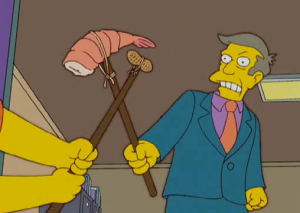
Juxtapose that with, say, the episode “Bart the Mother” from season 10. In this episode, Bart accidentally shoots a bird, is torn up inside by it, so he rescues its eggs to help them hatch. Even when they turn out to be bird killing lizards, he still protects them and saves their lives. This is the exact same character acting in completely opposite ways. This is confusing, this is maddening, and this leaves you unable to say who “Bart Simpson” is anymore. Additionally, the Bart Simpson of the later episode, the one brandishing a peanut on a stick for evil, leaves a bitter taste in your mouth. It renders the character completely unlikeable for the rest of the show’s run, or at the very least unsympathetic. You can’t undo the actions of the characters within the show, even a show such as The Simpsons which tells mostly stand alone stories with their episodes. In an episode this season, a plan by Bart to make Mrs. Krabappel more fun ends up getting her fired and he feels terrible about it. He plans to get the new teacher fired so she can get her job back, but then thinks better of it, because he wants to believe there is still a bit of goodness left inside him. Sorry, Simpsons writers, but that ship has sailed. You can’t suddenly re-ascribe old character traits to Bart. How, exactly, are we then supposed to reconcile the events of previous episodes? Had this latest episode taken place in an earlier season, I may have enjoyed it. However, at this point it just rang hollow and annoyed me.
Now, let’s take the other Simpsons child (I, like Homer, am ignoring Maggie), Lisa. There is often a problem with Simpsons episode in where Lisa has to act like a child. Early in the show’s run, they needed a voice of reason and rationality within the family, and with the other characters tied up with their own roles that fell to Lisa. She has always been exceedingly smart, so world wise and intelligent than if it wasn’t an animated show it would ring as false and annoying to me. However, occasionally to tell a story they need her to act like a child which means taking on traits that, while typical of your usual eight year old, does not jive with her character. Take, for example, the episode in where Lisa develops a fear of the cemetery that is put up outside her bedroom window. Normally, Lisa would be too pragmatic and rational for this, but there is no other way for The Simpsons’ writer to tell this story. Since most of the time when Lisa acts her age it is part of a story of emotional depth rather than hollow zaniness, I usually let it slide. However, I could certainly see it bothering some people.
On the other hand, here is a recent example of Lisa acting in a way that completely flies in the face of everything we know about her as a character. In the episode “Pranks and Greens” Bart befriends an aging prankster (played by Jonah Hill so you know it’s hilarious) and tries to help him turn his life around. The genesis of his decision, however, comes after Lisa snarkily calls the two of them losers. Repeatedly. In an obnoxious voice she has never before used. With his finger and her thumb in the shape of an L on her forehead. At the end of the episode she does this again when she finds out that Jonah Hill’s character has gotten a job writing for Krusty’s show in an oh so hilarious meta gag about the show’s writers, and indeed all television writers (and perhaps even all aspiring television writers, such as yours truly). In this episode, Lisa exhibited a side of her we hadn’t see in the 446 episodes before this one or the one after it; Lisa, the arbiter of cool.
Throughout the entire run of the show Lisa has been an unpopular, awkward, social outcast. She rarely, if ever, is shown to have friends. Take, for example, the episode “Summer of 4 Ft. 2” in which the Simpsons stay at the Flanders’ beach house. Nobody’s signs Lisa’s yearbook at the school year’s end. Why? Because she is unpopular. Why? Because she is an overachiever who never missed class and apparently undertook the kind of disturbing task of timing how long people used the restroom. She desperately tries to change herself at the beach house where nobody knows her. She succeeds to some degree, despite Bart’s attempt to sabotage her (which he later regrets, again flying in the face of the later Bart), and we all feel good for her after she, and her friends, accept her for who she is. The point of this episode, as well as the point of Moby Dick, is be yourself.
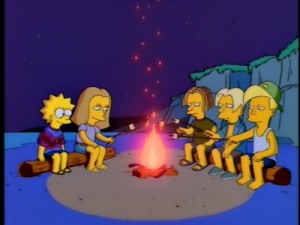
Lisa, the liberal, the Buddhist who seems kosher with most religions (including Wiccans), the vegetarian who learned a valuable lesson about not forcing your opinions on others from Paul and Linda McCartney, suddenly is dismissing all television writers as losers? I could see her pointing out to Bart that his new hero’s life isn’t all that impressive, but to do it in the way she did it just didn’t ring true with me. As such, it was really quite annoying. Needless to say, I did not like that episode.
There are many other examples. Whenever they try and give Moe a semblance of a heart or a conscience despite so much evidence to the contrary never works for me. Homer being virulently homophobic in one episode (though he admittedly becomes more tolerant late in the episode), then living with two gay men and suddenly become more effete (for the lack of a better term) in a later episode, and then in an episode after that holding up a sign saying “Death Before Gay Marriage” in a protest, before quickly discarding it and becoming a minister to perform gay marriages. However, these are all example of character traits that have been suddenly adopted and discarded at the whim of various writers. The very history of these characters has been messed with as well. I speak, of course, of the dreaded retcon episode.
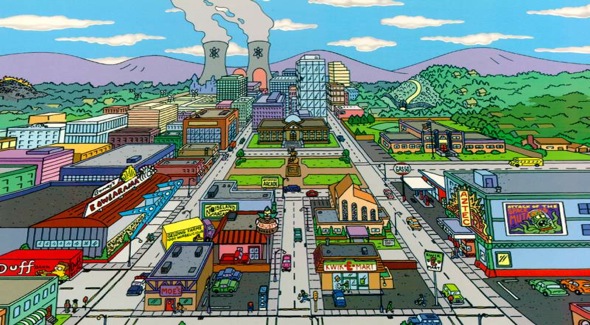
I was disappointed that you didn’t bring up the Tanzarian/Principal Skinner episode as that was the episode where The Simpsons jumped the shark/boned the fish. It did everything that you hate the writers doing; it ascribed a new trait to Principal Skinner (that being he wasn’t really Skinner, being a delinquent), introduced a new character (the real Skinner) and conviently threw that new character and the new traits out the window by the end of the episode. Skinner being a delinquent adds a new level of interaction between him and Bart as Skinner is no longer solely a bumbling authority figure. He’s a Bart Simpson that turned his life around. But don’t worry; that’s completely discarded so you don’t have to think about it too much. This is what I’ve heard to referred to as negative contuinity.
The Simpsons usually handles it well most of the time but the problem is that the writers don’t adhere to it all the time. Characters like Artie Ziff, Herbert and character traits like Lisa’s vegetarianism should disappear by the end of the episode and never be brought up again if the writers adhere to negative contuinity. But then you have characters like Hank Scorpio and “Michael Jackson” who never appear again as examples of when writers do adhere to negative contuinity.
As for the talent of the writers, a friend of mine compared the current and recently past Simpsons writers to fanfic authors. They are a fan of the source material and have their interpretation of a character regardless of any factual proof otherwise. The”That 90s Show” episode being the perfect example. I agree with his observation and wish I could claim it as my own.
The moment that the Simpsons jumped the shark (or “boned the fish”) for me was several seasons ago when the family was sent to Guantanamo Bay for Bart disrespecting the US flag. I’ve always appreciated the sly political jokes that have been inserted into episodes (“WIMP, am I?” – GHW Bush), but when the political humor became the central storyline it just seemed to be trying too hard without a payoff. One thing I think we can agree on is that “classic” episodes are evergreens – you don’t *need* the pop culture or social context to get them. Sure, some individual jokes may go overhead, but the episode as a whole stands on its own. I like to think that in 20 years when I’m watching the Simpsons with my kids, the Hank Scorpio episode will still be funny (I am assuming the Bond franchise will continue well into the future). But I can’t see them “getting” the Guantanamo episode without a lot of explanation and background from me.
Fortunately, many of the Bond movies themselves are evergreen, so even if the franchise peters out (which is a distinct possibility, given their failure to recapture what made Casino Royale so good with its sequel, and the last few Pierce Brosnan movies showing that the classic formula is pretty much tapped out) Many of its conventions will still be pop-culture staples for decades to come.
I don’t disagree with the analysis (I go long periods now between Simpsons viewing), but I find the tone of this piece grating, mostly because I worked on a show that went to 250 episodes and the stories got very, very difficult. So naturally I sympathize with the writers, instead of thinking that they’re these titanic failures who are overlooking obvious solutions. It’s not that the fanfic metaphor isn’t true; it’s just that the predicament seems more or less unavoidable.
I like to compare it to ballplayers. A great player who’s aging is often still a good player, but he suffers by being compared to what he once was.
Finally, I would fix this sentence: However, would they have only stuck with the characters we fell in love with in the first place the show could have probably overcame its decline in comedic quality., particularly if the very next word is the de haut en bas “Alas.” But that’s just me.
The Principal and the Pauper (the Tamzarian episode) I didn’t mention because my feelings on it are conflicted. In listening to the audio commentary on it, writer Ken Keeler explained that his point when writing the episode was to point out how attached people can get to characters on TV shows and how when you change something about them, people are livid. The episode’s main theme is that while Skinner isn’t Skinner per say in terms of his history, he is the same guy characteristically and emotionally that people have always known.
My main issue, then, with the episode, is that they used a character whose history we were familiar with with flashbacks and such. If, for example, Lenny, had some sort of different history than the characters had been led to believe, Mr. Keeler could have dealt with the same themes. However, he chose Skinner, who had a well established back story, and that is what aggravated people. Of course, Keeler’s contention was that such aggravation at television characters was the very thing he was satirizing, but I don’t know why you would want to mess with the emotions of your loyal fans.
Anyway, my problems with that episode aren’t as egregious as other episodes, so I didn’t really mention it, but there is certainly reason to dislike said episode. I was mostly concerned with when they changed characters emotionally, though I did mention the retcon that was in the similar vein to The Principal and the Pauper.
Also, I do realize I said that in the boy band episode they were subliminally recruiting for the army, when, of course, it was for the navy. Yvan Eht Nioj and all that. Error on my part. I apologize.
Mr. Marcil,
I understand where your sympathy comes from, and I do also realize that it is probably staggeringly difficult to come up with episode ideas once a show has run for a long period of time, let alone 400+ episodes. However, you will notice that I didn’t really disparage the writers for their storyline choices, except on a few occasions when I found it particularly egregious and lazy (for example the exact double episode).
Often times The Simpsons have a very loose (The Simpsons go to X place) or silly plot, but I let it slide generally because I realize that original plots are hard to come by at this point. However, I cannot abide them blatantly changing character traits and rendering us unable to really relate to the characters. They could have continued to tell stories without giving the characters convoluted and conflicted characteristics I feel.
Anyway, since you wrote for Daria (I both clicked your link on this page and then checked out your IMDB) and you have had a chance to work my dream job, I respect and appreciate your insight.
Two things:
1) The leprechaun jockey episode may have been a hot mess, sure. But it was also, at the time, one of the most effective meta-episodes of television I had ever seen, taking to task both the show itself and the more nitpicky segments of its audience, both of which richly deserved the ribbing.
2) In the context of fish, “bone” and “de-bone” mean the same thing. If that helps.
There were a lot of good points in this article, but it’s a struggle to take someone seriously when he clearly doesn’t understand the past participle.
Love,
A grammar nazi.
Hey! I understand the past participle! I just never proofread my work because I am a jackass! So there!
While I agree the show has gone steadily downhill, I have to disagree with some of your illustrative examples.
You’re a little too unforgiving when it comes to characters making uncharacteristic choices and/or having lapses in ordinarily decent judgment. Personally, I think it makes the characters easier to relate to on a human level. We all have lapses in judgment and all but the most boring of us act uncharacteristically from time to time. If the characters were perfect molds, I think the show would be even worst than it is now.
In the case of Bart, he’s always had a few episodes where his bad boy streak has gone over the top and he’s usually paid the price (I believe he and Skinner both wound up in the hospital for their allergic reactions to shrimp and peanuts, respectively). I don’t think that means he can never go back to the kid who can sometimes show some tenderness and good judgment when it really counts.
On Lisa, if you’ll notice, she very typically acts her age when it comes to dealing with Bart. So, her goading Bart and his new found prankster friend by calling them losers, isn’t so out of character. She’s always looking for ways to get back at her brother who’s always deriding her for her intellect. Also, if you’ll recall, the cemetery episode actually dealt directly with Lisa thinking she was too smart to be afraid of monsters and cemeteries and such. She kept trying to deal with her fear rationally and logically, but was still afraid, until the monsters told her that it was perfectly normal for her to be afraid sometimes as an 8-year-old girl.
Also, the Party Posse was purposed to recruit people into the Navy, not the Army. And they weren’t leprechaun jockeys, they were elf-like (as in Keebler) or troll-like creatures that lived “underground in a fiberglass tree”. ;)
And now, I’m officially overthinking it. :P
The Simpsons suffers from a lot of the same things that comic books and soap operas suffer from. When characters spend decades essentially caught in a weird nowhereland (Lois Lane didn’t figure out Clark Kent’s secret for, what, like 60 years?) where technology (and the writer) changes around them while they’re caught being essentially the same. Marvel and DC have dealt with this by resetting the universe every now and again. Soaps deal with it with wacky explanations (his TWIN died, she survived the crash but suffered amnesia and was kidnapped by a prince who fell in love with her beauty) in the name of continuity. The Simpsons doesn’t have an easy vehicle by which to do this and, by and large, it’s comedic so it doesn’t matter.
I also have very little problem with the Bart Skinner/baby animal disconnect. You can’t think of instances in the real world where a person would punch another person in the face without thinking twice but would adopt a lost puppy?
This piece starts out strong but by the end devolves into a somewhat pedestrian fan-rant, and the strong hint of “Why don’t they just let *me* write for the show??” makes it a bit whiny. The topic is a question worth exploring, though.
The little breaches of character are something that bother me, too, but when writing for a show with such a long history, it’s easy to get hamstrung if you let those things stop you. I don’t think they can afford to throw away ideas anymore, and if they got too picky the show would never get done.
Essentially, if you’re in the writer’s room trying desperately to crank out another episode of The Simpsons when practically every idea has been used, and then someone says “Bart and Skinner threaten each other with allergies,” and it makes the room laugh, then it’s getting used.
In the room, it’s frowned upon to be the one saying “We can’t use that funny idea because blah blah blah” without offering an alternative, because then you’re just the one stopping the writing from getting done without being constructive. And shooting down ideas before they start can be paralyzing for a writer.
In my opinion, there’s not much anyone could do to make me care about The Simpsons. Yes, recent episodes are lackluster, but I think the biggest problem is that everything about the show, from the characters to the tone, is just too familiar. We’ve seen everything happen to these characters hundreds of times over and just the sheer volume makes nothing seem to matter. Since Al Jean came back, I feel like we’ve seen a revival of the “Homer and Marge have a falling-out and then make up” episodes, which was once one of the show’s strongest formulas, but now nothing could be more meaningless. These stories have gotten so worn out that regardless of continuity, each one has zero stakes. Not only do we know that Homer will get her back (after all, we knew that even in early seasons), we don’t even care how he does it. Besides, these days it’s likely to be a lazy throwaway joke anyway.
I think the throwaway endings of the Scully years (esp. the one where they end up on the island, or when the volcanic eruption is interrupted by a telethon) were pretty funny, and were kind of meta jokes about how TV show endings don’t really matter. However, they might have worked too well, since they also set a bad precedent where it made them matter less, and made it hard to care about a Simpsons ending ever again.
Also, I missed the un-retcon episode, but IMO “That ’90s Show” was one of the best episodes of recent seasons because it actually surprised me. And if you disregard the era-specific signifiers, it doesn’t really contradict past backstory.
I think a lot of the discontinuities with character actions can be disregarded if you look back to the conceptual forerunner of The Simpsons: Commedia del Arte. Practically all of the principle Simpsons characters are direct reflections of characters in the Commedia, or at least aspects thereof, with Homer reflecting Zanni, Bart reflecting Arlecchino, Mr. Burns reflecting the miserly aspects of Pantalone, and so forth, and like the Commedia, the actions in any given performance of The Simpsons aren’t expected to have any bearing on future episodes.
In the Commedia, as in The Simpsons, characters have traits that are used and discarded as necessary, with Bart being unncessarily cruel in one episode and having a conscience in another, or Pantalone being lecherous in one performance, but simply miserly in another. It might seem like lazy storytelling and characterization, but it’s all a matter of intent. The characters that people love are archetypes and sketches that’re filled out as they need to be for the purposes of the comedy being told.
In short, I think this article was thought, but not necessarily overthought.